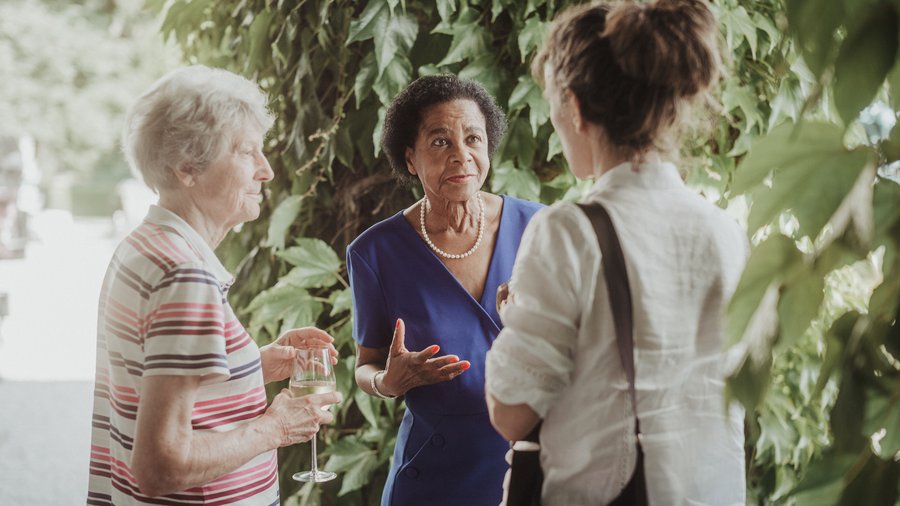Leading women from across Africa are showing the world a model of leadership that embraces interdependence, compassion, and the deep wisdom of lived experience
Across the African continent, women are reshaping leadership, not just through policy, but by reimagining the very nature of power. A new model is emerging: one that embraces interdependence, compassion, and the deep wisdom of lived experience.
“To be human is to be interdependent within the web of life,” said Dr. Mamphela Ramphele, physician, activist, and former managing director of the World Bank. “You cannot be a compassionate leader if you don’t have self-compassion.”
This vision of transformative leadership was at the heart of this year's Salzburg Global Weekend, where the annual spotlight on “Centering Africa” brought together leaders, changemakers, and thinkers from across the continent and diaspora. Conversations with Dr. Mamphela Ramphele and Dr. Agnes Binagwaho, pediatrician, academic, and former Health Minister of Rwanda, spotlighted the urgent need to rethink systems of power and the pivotal role women play in that shift.
Research shows that when women lead, entire communities benefit. In Rwanda, where women now hold over 60% of parliamentary seats - the highest percentage in the world - laws addressing gender-based violence, education, and healthcare have expanded dramatically. In global health, women leaders have been shown to have a positive impact on maternal and health care policies, strengthen health facilities, and reduce child mortality and health inequalities. All over the world, female representation leads countries to adopt more stringent climate change policies and mitigates the negative effect of climate vulnerability on child health outcomes.
Yet, despite the evidence, women remain underrepresented. According to UN Women, as of June 1, 2025:
- Only 27.2 per cent of parliamentarians worldwide in single or lower houses are women.
- Just 31 countries are led by female heads of state or government.
- Women's political participation is still often blocked by systemic, cultural, and institutional barriers.
The System Isn’t Broken, It Was Built This Way
“The current sociopolitical systems are against what it means to be human,” Mamphela said at Salzburg Global. “They are extractivist, individualist, and designed to create winners and losers.”
Agnes emphasized that shifting these systems requires structural tools such as political quotas. “You need 50% of both genders,” she said. “In the beginning, we need quotas so the political parties promote women to be representatives.”
That push must also include collaboration. “Find powerful men who will support you,” Agnes advised. “It’s not that men aren’t sensitive, but what attracts women to leadership is often different. It’s complementary to men’s leadership.”
Her words are backed by evidence, which finds that diverse teams make better decisions and perform more effectively long-term. Women in leadership bring a more holistic, community-focused perspective, especially when it comes to caring for the vulnerable.
“When you care about the most vulnerable,” said Agnes, “you care about everyone.”

Dr. Agnes Binaghwaho at Salzburg Global Weekend in June 2025. Photo Credit: Richard Schabetsberger
A Different Kind of Power
What African women are modeling is not just representation, but rather a redefinition of leadership itself. Agnes described innovative practices like “Mondays with the Minister,” a Rwandan initiative she pioneered that gave citizens free access to speak directly with the health minister every other Monday. “Give a voice to each and every person, and create systems that help people do good,” she noted.
These approaches reflect the African philosophy of “Ubuntu” - ”I am because we are” - where leadership is grounded in mutual respect, accountability, and care. In a continent where 90% of a woman’s income is reinvested into her family, and where each additional year of a girl’s schooling increases her future wages by 10-20%, empowering women is not just the right thing to do, it’s the smart thing.
Reclaiming Leadership for All
What African women leaders are showing the world is not that inclusive and compassionate leadership works, but that it is essential. Decision-making tables need to reflect the full richness and diversity of society, so that the policies that emerge are more just and more effective.
This year's Salzburg Global Weekend is part of our Annual Spotlight: “Centering Africa." Across our sessions and events in 2025, Salzburg Global is highlighting the central role that the African continent will play in global development now and in the next decades. As demographic trends across much of the world project a future of older and less productive economies, the African continent stands out for its growing youth population, dynamism and innovation. In reimagining an international system that better responds to the needs of the 21st century, it is our hope that Salzburg Global can play a small but meaningful role in centering African ideas, innovations, and perspectives in global forums like ours.


